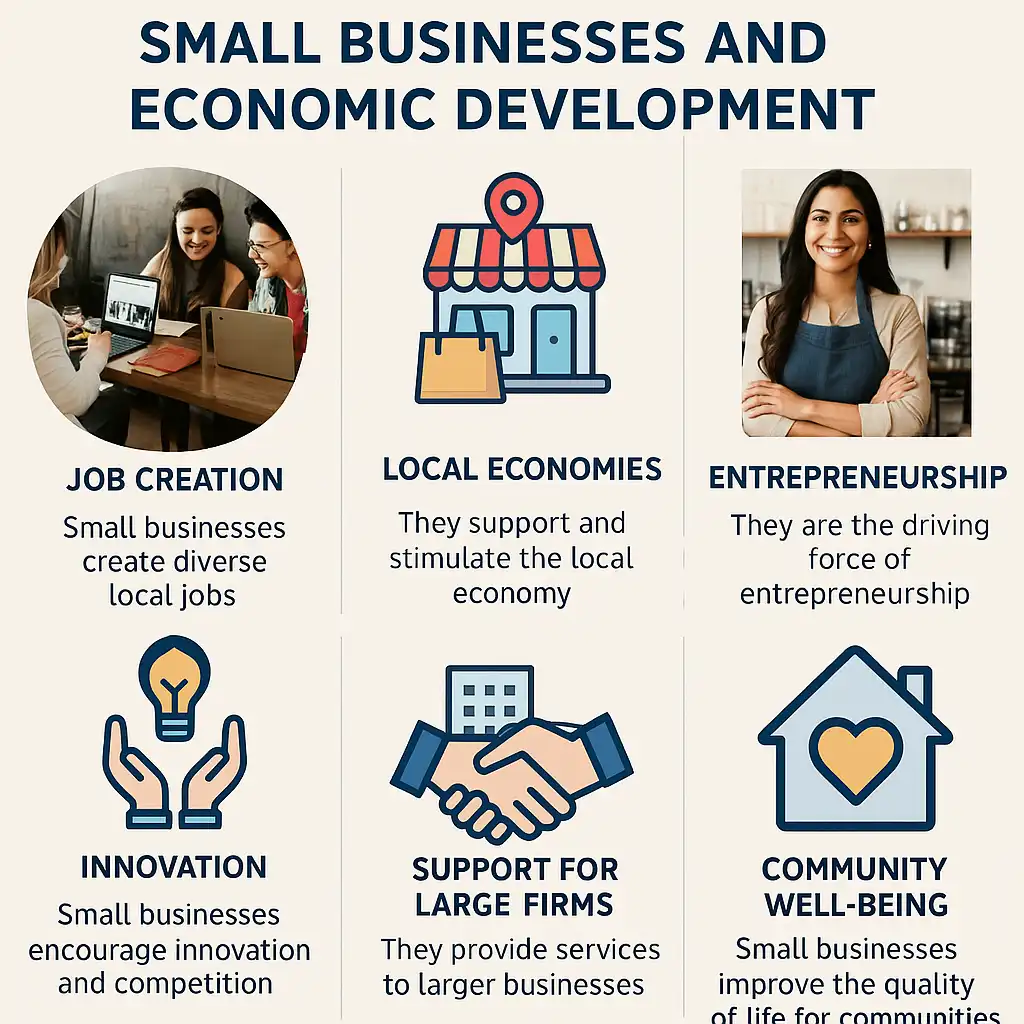Small businesses play a huge role in the economic development of a community, region, or even a country. They might be small in size, but they contribute a lot to growth, job creation, and the overall health of the economy. Here’s how small businesses help:

1. Creating Jobs
Small businesses are often the largest source of employment in many areas. These businesses hire local workers, which helps reduce unemployment and gives people a steady income. Since small businesses tend to be in close-knit communities, they also provide opportunities for people who might not have the skills or qualifications to work in big corporations.
2. Supporting Local Economies
Small businesses are typically locally owned, meaning that the money they make stays in the community. When a small business does well, it spends money locally too—whether that’s on supplies, services, or hiring local employees. This helps other local businesses and creates a cycle of economic growth.
3. Encouraging Innovation
Small businesses often come up with new ideas and creative solutions to problems. Since they are usually more flexible than large companies, small businesses can quickly try new things and introduce innovative products or services. This can lead to new industries, technologies, and ways of doing business that improve the overall economy.
4. Increasing Competition
When there are lots of small businesses, it increases competition, which helps keep prices fair and encourages companies to provide better products and services. Healthy competition means customers have more choices, and businesses have to work harder to meet their needs.
5. Fostering a Strong Entrepreneurial Spirit
Small businesses are often started by entrepreneurs—people who are willing to take risks to start something new. Encouraging entrepreneurship leads to more innovation, as well as the creation of new products, services, and even entire industries. This entrepreneurial spirit can inspire others to start their own businesses, leading to even more job creation and economic development.
6. Building Community Wealth
Small businesses help to build wealth in local communities. As they grow, they create more opportunities for people to earn money, which helps families improve their quality of life. The more wealth that stays within the community, the more resources there are for things like schools, roads, and public services, which can further improve the economy.
7. Providing Services to the Larger Businesses
Small businesses don’t only serve individuals or families—they also provide important services to larger businesses. For example, a small supplier might provide materials for a large manufacturer, or a local marketing firm might help big companies advertise. By providing these services, small businesses help support the operations of larger businesses, which keeps the entire economy functioning smoothly.
8. Attracting Investment
Small businesses can attract investment from individuals or institutions who are looking for new opportunities to grow their money. This investment helps small businesses expand, hire more people, and develop new products, all of which help grow the economy. It also encourages investors to look for more opportunities in the local market.
9. Contributing to Tax Revenue
Small businesses also pay taxes, which helps fund important services like schools, roads, healthcare, and public safety. As small businesses grow and succeed, they contribute more to tax revenue, which can then be reinvested in the community to support further development.
10. Improving Quality of Life
By offering products and services that meet local needs, small businesses improve the overall quality of life in their communities. They often provide specialized or unique products that large companies can’t, and this diversity makes the local economy more interesting and vibrant. Plus, many small businesses invest in improving their communities by sponsoring local events, supporting charities, or offering services that make life easier for residents.
Summary:
Small businesses are vital to economic development because they create jobs, support local economies, encourage innovation, and help build a strong, competitive market. They also promote entrepreneurship, provide services to larger businesses, attract investment, contribute to taxes, and improve the quality of life for everyone in the community. Even though they might be small in size, their impact on the economy is huge.
Tags: and contributing to community development., and economic sustainability are all key aspects of understanding the importance of small businesses in fostering economic progress. Small businesses, business expansion, Businesses, community development, community wealth, competition, creating innovation, economic development, economic growth, entrepreneurial spirit, Entrepreneurship, have a huge impact on the overall economic health by driving job growth, innovation, investment, investment attraction, job creation, local economies, local market, local suppliers, public services, quality of life, services for larger businesses, small business impact, Small businesses, supporting local economies, tax revenue, though small in size


